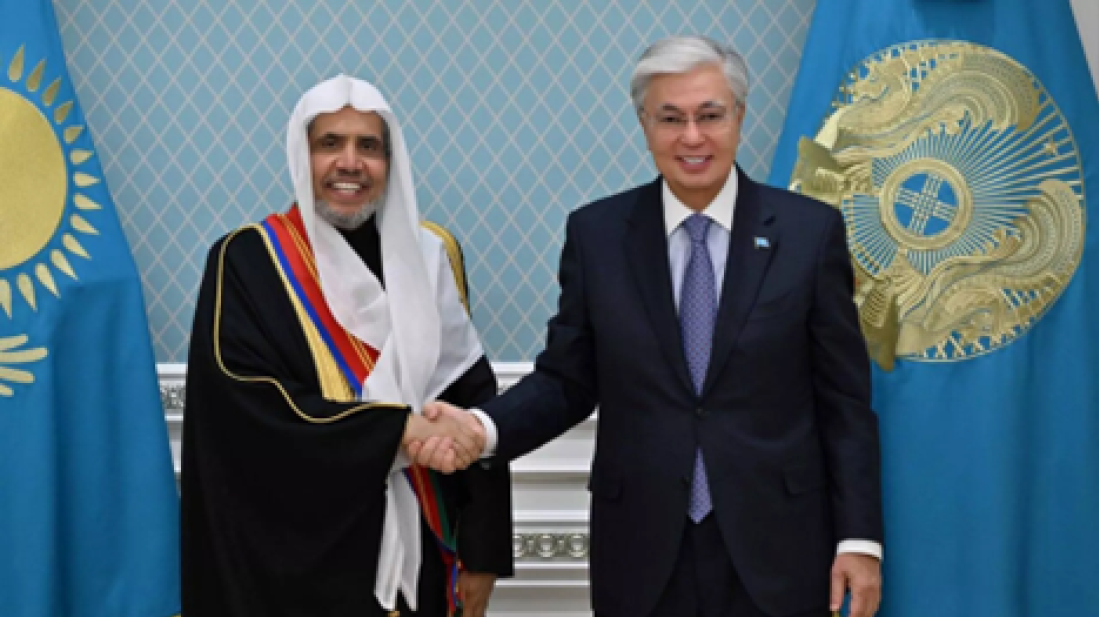Ukraine imposes new sanctions targeting Russian maritime and defence supply chains
Ukraine’s President Volodymyr Zelenskyy has approved new sanctions targeting Russian maritime operators, defence-linked companies and individuals co...

The eighth Congress of World and Traditional Religious Leaders has commenced in Astana, bringing together around 100 delegations from 60 countries.
The forum includes representatives of various religious traditions, ranging from Islam and Christianity to Buddhism and Zoroastrianism, as well as politicians, international organisations and public figures.
The main objective of the congress is to discuss the role of religion in addressing contemporary global challenges such as conflict prevention, combating radicalisation, ethical issues surrounding artificial intelligence and problems of digital inequality. Particular attention is also given to the possibilities for interfaith cooperation in humanitarian fields such as education, healthcare and social support.
Kassym-Jomart Tokayev, the President of Kazakhstan, emphasised the importance of interreligious and intercultural harmony as a priority in the country’s domestic and foreign policy. According to him, holding the congress for 22 years reflects Kazakhstan’s long-term commitment to fostering dialogue among religious communities. Discussions were held on strengthening cooperation, including with Saudi Arabia during a meeting with Sheikh Muhammad bin Abdulkarim Al-Issa, Secretary-General of the Muslim World League.
Kazakhstan has prior experience acting as a mediator in international conflicts and diplomatic initiatives. Examples include the Astana Process on Syria, the Five plus One negotiation format, chairmanship of the Council for Cooperation and Confidence-Building Measures in Asia, and participation in the United Nations Security Council.
In 2025, the country proposed establishing an International Platform for Strengthening Interreligious Trust with the support of the United Nations and the Organisation for Security and Co-operation in Europe (OSCE), building on its accumulated experience in interfaith dialogue.
In this context, the eighth congress is seen not only as a religious forum but also as a platform for developing multilateral strategies for sustainable development and security. It is planned that the congress will conclude with the adoption of a declaration and the presentation of an action programme extending to 2033, marking the first time such a document has been produced in the history of the event.
The forum is taking place against the backdrop of increasing religious polarisation and a crisis in international institutions, making the issues discussed especially relevant.
The presence of a wide range of religious leaders and international representatives underscores the desire for dialogue and the search for joint solutions amid global turbulence.
Quentin Griffiths, co-founder of online fashion retailer ASOS, has died in Pattaya, Thailand, after falling from the 17th floor of a condominium on 9 February, Thai police confirmed.
Ukraine’s National Paralympic Committee has announced it will boycott the opening ceremony of the Milano Cortina 2026 Paralympics in Verona on 6 March, citing the International Paralympic Committee’s decision to allow some Russian and Belarusian athletes to compete under their national flags.
Eric Dane, the actor best known for his roles in 'Grey’s Anatomy' and 'Euphoria', died on Thursday, at the age of 53 after a battle with amyotrophic lateral sclerosis (ALS). His family confirmed his death after what they described as a “courageous battle” with ALS.
An Austrian climber has been convicted of gross negligent manslaughter after his girlfriend died from hypothermia while climbing Austria’s highest peak, the Grossglockner, in January 2025.
President Donald Trump said on Saturday (21 February) that he will raise temporary tariffs on nearly all U.S. imports from 10% to 15%, the maximum allowed under the law, after the Supreme Court struck down his previous tariff program.
Ukraine’s President Volodymyr Zelenskyy has approved new sanctions targeting Russian maritime operators, defence-linked companies and individuals connected to Moscow’s military and energy sectors, according to official decrees issued on Saturday.
Divers have recovered the bodies of seven Chinese tourists and a Russian driver after their minibus broke through the ice of Lake Baikal in Russia, authorities said.
A technical fault in the helium system of NASA’s next-generation moon rocket was announced on Saturday, ruling out the planned March launch window for the Artemis II mission.
President Donald Trump said on Saturday (21 February) that he will raise temporary tariffs on nearly all U.S. imports from 10% to 15%, the maximum allowed under the law, after the Supreme Court struck down his previous tariff program.
Germany's ruling conservatives on Saturday (21 February) passed a motion to ban social media use for under 14s and introduce more stringent digital verification checks for teenagers, building momentum for such limits in Germany and elsewhere in Europe.
You can download the AnewZ application from Play Store and the App Store.

What is your opinion on this topic?
Leave the first comment